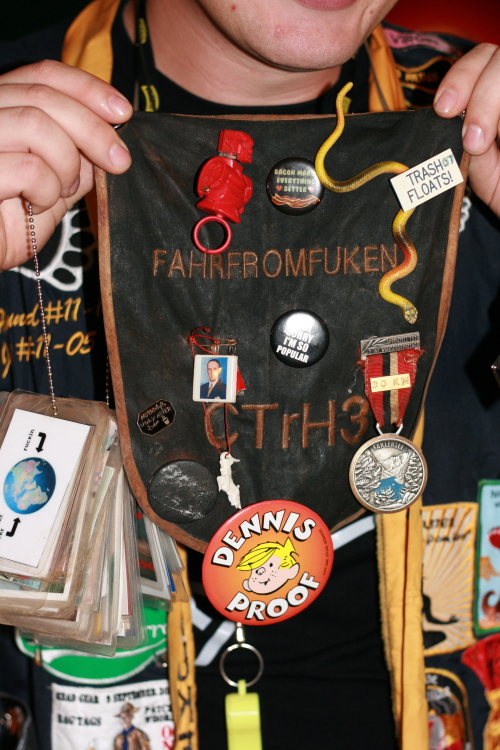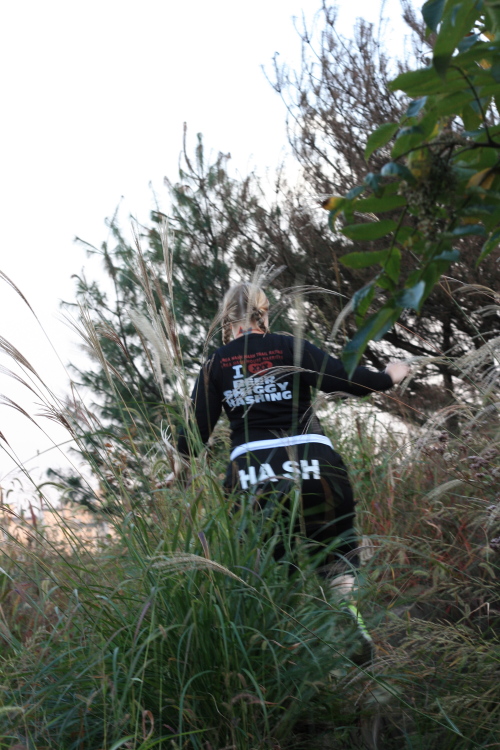Korean runners tell why ‘what happens on the Hash, stays on the Hash’
The man standing at the bar is wearing a flesh-colored rubber mask and a full-length “Happy Coat.” The lightweight Hasher’s robe is adorned with dozens of sew-on patches, giving him the air of a big goofy Gandalf. He grips a mug of beer in his hand and a glow stick between his teeth, protruding like a blue cigar from his mouth slit.
Many of the 30 or so men and women gathered in the Haebangcheon VFW bar are wearing similarly odd paraphernalia for the first night of Korea Nash Hash 2011.
Several sport similar jackets to Gandalf ― his “real” Hash name is Wood n’ Nut ― others wear necklaces, patches or bibs spelling out nicknames such as “Bootylicious,” “Ki Wi Wee Wee” and “Too Big.”
 |
A Hasher shows a bib bearing his nickname at a Korea Hash Nash 2011 social in VFW bar in Haebangcheon, Seoul on Friday. |
Others are simply kitted out in Hash-branded sportswear fit for tackling the mile-long chalk trail they have just followed through the backstreets of Seoul’s Itaewon and Namsan.
They are all members of Korean Hash House Harriers kennels ― exercise groups which meet regularly to run together before drinking themselves silly. Costumes and camaraderie involving bawdy songs form risque run-meets characterized by the international Hashing motto: “A drinking club with a running problem.”
The annual 10-day Korea Nash Hash festival of Hashes in the greater Seoul area every day until Monday gives different kennels the chance to host runs of varying lengths on their home turf, and to welcome new members into the fold.
The event's coordinator Dodic, who runs around three Hashes a week here in Korea, having become hooked after running his first in Fort Eustis, Virginia, in 1980, said: “Hashing is for people that are more adventurous and like to go out and do things and see things.
“When you Hash in different countries, and here in Seoul, you go to different locations and see different parts of the city. It’s a great way to have a good time and see Korea.”
 |
A woman wearing “Hash” shorts makes her way through “Shiggy” — the name Hashers give to shrubbery or rocks in their path — on a trail set by the Seoul Hash House Harriers in Ilsan on Saturday. (Kirsty Taylor/The Korea Herald) |
There are more than 20 clubs in South Korea from Geoje-do to the 38th Parallel with members aged from their 20s to 70s. The largely expat demographic comes from all lines of work including diplomacy, business, the military and teaching.
First started by British Expats in Kuala Lumpur in 1938 as a way of curing weekend hangovers with beers and a brisk run ― the practice of following a paper, chalk or flour trail set by a “hare” through the city and countryside soon spawned thousands of active kennels in 135 countries, now with an estimated 200,000 Hashers worldwide.
In spite of the large membership, longtime Hasher BOA, 29, explained that most participants prefer to stay under the radar lest others “in the real world” find their post-run debauchery a little off-color.
“What happens in the Hash stays in the Hash,” the Seoul-based diplomatic worker said. “We have people from very high business jobs, teaching and the army here. But most of our bosses don’t know what we do, or if they do, they don’t like it.”
Unrepeatable songs and raucous drinking rituals mean that Hashers don’t care to reveal their real names in print ― but said the politically incorrect humor of the post-run “circles” keeps them returning to their kennels for run after run.
“I go to about three or four hashes over every weekend, and even on my lunchtimes too,” BOA, who earned his “Blacks Out Alone” nickname during an incident at the Boryeong Mud Festival.
“Right now it is part of me. If Hashing was a religion, it would be my religion. It is the greatest thing, with the greatest people.”
A secret handshake helps Hashers identify each other in real life, forming an immediate bond. And private social networking site Hashspace connects members internationally, prompting offers of airport pickups, accommodation and even jobs should a fellow Hasher post that they are relocating to a new city.
U.S. Army soldier, known as Fahr From Fuken, said that at times hashing rituals can accidentally seep into his real life.
The keen Hasher ran with the Bagram Hash House Harriers following trails on-base while posted in Afghanistan, quaffing non-alcoholic beer and toning down the bawdy ballads “out of respect for the uniform.” But he still has to watch his mouth on duty here in Seoul.
“At work if someone says one of the verbal cues, perhaps something like ‘put on your headgear,’ and I will start to do the Hash callback for ‘head’ before remembering ‘oh wait ... you can’t say that here.’”
At home in the U.S., Hashing is something enjoyed by both him and his wife, who he’ll next see when he takes leave to set a trail for other Hashers to follow though South Carolina swampland at an international meetup this month.
While trails vary in length and terrain from paved walkways to waist-high wading, Hashing is not for everyone, even BOA concedes: “We bring in people and they show up for one or two and then never come back.”
But many others get hooked on the strange rituals ranging from chugging beer from a bedpan ― as the Seoul Hash House Harriers men’s club have since 1972, and adapt to pointing only with their elbows joking that “we don’t know where our fingers have been.”
“Initially I had my reservations,” said 28-year-old Welcome Homo, who is currently posted in Seoul with the U.S. Army.
“I mean, it definitely sounded kind of odd. But after trying it out, I have been involved ever since. I like the camaraderie imposed by it. I like to run and I like to drink, it is a good time all round.”
Nash Hash events will run daily through this weekend ― search “Korea Nash Hash”on Facebook for more information.
By Kirsty Taylor (
kirstyt@heraldcorp.com)









